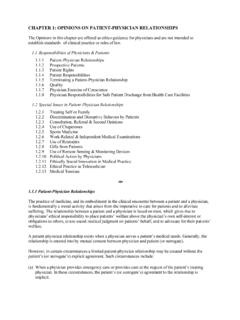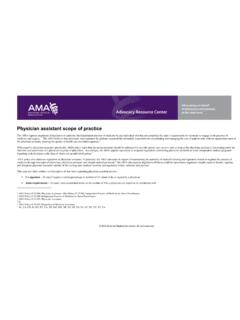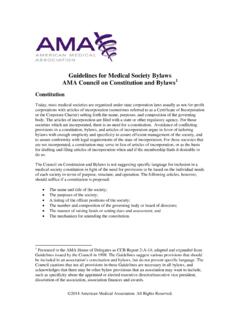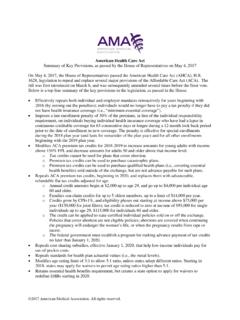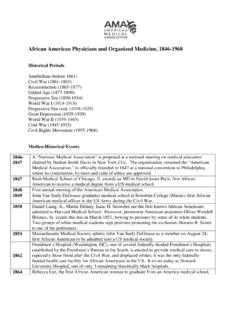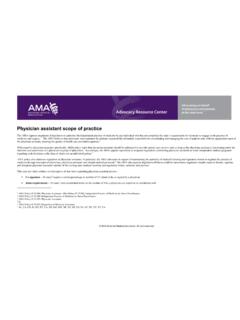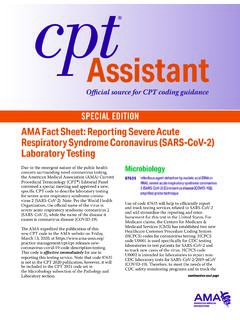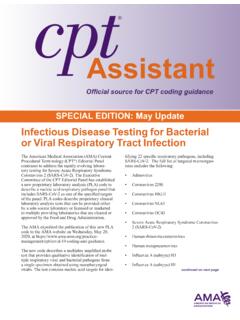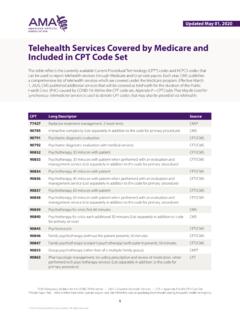Transcription of Code of Medical Ethics - American Medical Association
1 CHAPTER 2: OPINIONS ON CONSENT, COMMUNICATION & DECISION MAKING The Opinions in this chapter are offered as Ethics guidance for physicians and are not intended to establish standards of clinical practice or rules of law. Informed Consent & Shared Decision Making Informed Consent Decisions for Adult Patients Who Lack Capacity Withholding Information from Patients Use of Placebo in Clinical Practice Reporting Clinical Test Results Substitution of Surgeon Decisions for Minors Pediatric Decision Making Confidential Health Care for Minors Mandatory Parental Consent to Abortion Treatment Decisions for Seriously Ill Newborns Genetic Testing of Children Communication with Patients
2 Electronic Communication with Patients professionalism in the Use of Social Media Informing Families of a Patient s Death Political Communications Soliciting Charitable Contributions from Patients Surgical Co-Management Informed Consent Informed consent to Medical treatment is fundamental in both Ethics and law. Patients have the right to receive information and ask questions about recommended treatments so that they can make well-considered decisions about care. Successful communication in the patient-physician relationship fosters trust and supports shared decision making.
3 The process of informed consent occurs when communication between a patient and physician results in the patient s authorization or agreement to undergo a specific Medical intervention. In seeking a patient s informed consent (or the consent of the patient s surrogate if the patient lacks decision-making capacity or declines to participate in making decisions), physicians should: (a) Assess the patient s ability to understand relevant Medical information and the implications of treatment alternatives and to make an independent, voluntary decision.
4 (b) Present relevant information accurately and sensitively, in keeping with the patient s preferences for receiving Medical information. The physician should include information about: (i) the diagnosis (when known); (ii) the nature and purpose of recommended interventions; (iii) the burdens, risks, and expected benefits of all options, including forgoing treatment. (c) Document the informed consent conversation and the patient s (or surrogate s) decision in the Medical record in some manner. When the patient/surrogate has provided specific written consent, the consent form should be included in the record.
5 In emergencies, when a decision must be made urgently, the patient is not able to participate in decision making, and the patient s surrogate is not available, physicians may initiate treatment without prior informed consent. In such situations, the physician should inform the patient/surrogate at the earliest opportunity and obtain consent for ongoing treatment in keeping with these guidelines. AMA Principles of Medical Ethics : I,II,V,VIII Decisions for Adult Patients Who Lack Capacity Respect for patient autonomy is central to professional Ethics and physicians should involve patients in health care decisions commensurate with the patient s decision-making capacity.
6 Even when a Medical condition or disorder impairs a patient s decision-making capacity, the patient may still be able to participate in some aspects of decision making. Physicians should engage patients whose capacity is impaired in decisions involving their own care to the greatest extent possible, including when the patient has previously designated a surrogate to make decisions on his or her behalf. When a patient lacks decision-making capacity, the physician has an ethical responsibility to: (a) Identify an appropriate surrogate to make decisions on the patient s behalf: (i) the person the patient designated as surrogate through a durable power of attorney for health care or other mechanism; or (ii) a family member or other intimate associate, in keeping with applicable law and policy if the patient has not previously designated a surrogate.
7 (b) Recognize that the patient s surrogate is entitled to the same respect as the patient. (c) Provide advice, guidance, and support to the surrogate. (d) Assist the surrogate to make decisions in keeping with the standard of substituted judgment, basing decisions on: (i) the patient s preferences (if any) as expressed in an advance directive or as documented in the Medical record; (ii) the patient s views about life and how it should be lived; (iii) how the patient constructed his or her life story; and (iv) the patient s attitudes toward sickness, suffering, and certain Medical procedures.
8 (e) Assist the surrogate to make decisions in keeping with the best interest standard when the patient s preferences and values are not known and cannot reasonably be inferred, such as when the patient has not previously expressed preferences or has never had decision-making capacity. Best interest decisions should be based on: (i) the pain and suffering associated with the intervention; (ii) the degree of and potential for benefit; (iii) impairments that may result from the intervention; (iv) quality of life as experienced by the patient.
9 (f) Consult an Ethics committee or other institutional resource when: (i) no surrogate is available or there is ongoing disagreement about who is the appropriate surrogate; (ii) ongoing disagreement about a treatment decision cannot be resolved; or (iii) the physician judges that the surrogate s decision: a. is clearly not what the patient would have decided when the patient s preferences are known or can be inferred; b. could not reasonably be judged to be in the patient s best interest; or c. primarily serves the interests of the surrogate or other third party rather than the patient.
10 AMA Principles of Medical Ethics : I,III,VIII Withholding Information from Patients Truthful and open communication between physician and patient is essential for trust in the relationship and for respect for autonomy. Withholding pertinent Medical information from patients in the belief that disclosure is medically contraindicated creates a conflict between the physician s obligations to promote patient welfare and to respect patient autonomy. Except in emergency situations in which a patient is incapable of making an informed decision, withholding information without the patient s knowledge or consent is ethically unacceptable.
